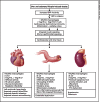DPP-4 Inhibitors as Therapeutic Modulators of Immune Cell Function and Associated Cardiovascular and Renal Insulin Resistance in Obesity and Diabetes
- PMID: 23946724
- PMCID: PMC3743398
- DOI: 10.1159/000348756
DPP-4 Inhibitors as Therapeutic Modulators of Immune Cell Function and Associated Cardiovascular and Renal Insulin Resistance in Obesity and Diabetes
Abstract
The prevalence of obesity and diabetes continues to rise in the United States and worldwide. These findings parallel the expansion of childhood obesity and diabetes. Obesity is a central component of the cardiorenal metabolic syndrome (CRS) which increases the risk for cardiovascular disease (CVD) and chronic kidney disease (CKD). The hallmark of obesity, CRS, and early type 2 diabetes is insulin resistance, a result of decreased insulin metabolic signaling due, in part, to enhanced serine phosphorylation and/or proteasome-mediated degradation of the insulin receptor substrate. Cardiovascular and renal insulin resistance significantly contributes to endothelial dysfunction, impaired cardiac diastolic and vascular relaxation, glomerular injury, and tubular dysfunction. In this context, multiple factors including oxidative stress, increased inflammation, and inappropriate activation of the renin-angiotensin-aldosterone and the sympathetic nervous system contribute to overweight- and obesity-induced systemic and tissue insulin resistance. One common link between obesity and the development of insulin resistance appears to be a low-grade inflammatory response resulting from dysfunctional innate and adaptive immunity. In this regard, there has been recent work on the role of dipeptidyl peptidase-4 (DPP-4) in modulating innate and adaptive immunity. The direct effects of DPP-4 on immune cells and the indirect effects through GLP-1-dependent and -independent pathways suggest effects of DPP-4 inhibition may have beneficial effects beyond glycemic control in improving CVD and renal outcomes. Accordingly, this review addresses new insights into the role of DPP-4 in immune modulation and the potential beneficial effects of DPP-4 inhibitors in insulin resistance and associated CVD and CKD prevention.
Keywords: Cardiorenal syndrome; DPP-4; Diabetes; Insulin resistance; Obesity.
Figures
References
-
- Reaven GM. Insulin resistance: the link between obesity and cardiovascular disease. Med Clin North Am. 2011;95:875–892. - PubMed
-
- Sowers JR. Obesity as a cardiovascular risk factor. Am J Med. 2003;115((suppl 8A)):37S–41S. - PubMed
-
- Ogden CL, Carroll MD, Curtin LR, McDowell MA, Tabak CJ, Flegal KM. Prevalence of overweight and obesity in the United States, 1999-2004. JAMA. 2006;295:1549–1555. - PubMed
-
- McGee DL. Diverse Populations Collaboration: Body mass index and mortality: a meta-analysis based on person-level data from twenty-six observational studies. Ann Epidemiol. 2005;15:87–97. - PubMed
-
- Ghandehari H, Le V, Kamal-Bahl S, Bassin SL, Wong ND. Abdominal obesity and the spectrum of global cardiometabolic risks in US adults. Int J Obes (Lond) 2009;33:239–248. - PubMed
Grants and funding
LinkOut - more resources
Full Text Sources
Other Literature Sources
Miscellaneous

